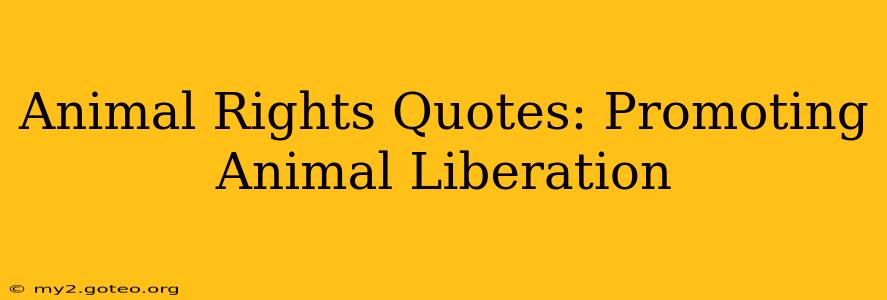The fight for animal liberation is a complex and multifaceted one, fueled by passionate individuals and organizations who dedicate their lives to protecting animals from cruelty and exploitation. Powerful quotes can encapsulate the essence of this movement, inspiring empathy, sparking dialogue, and driving action towards a more compassionate world. This article explores impactful animal rights quotes, examining their meaning and highlighting their significance in the ongoing struggle for animal welfare. We'll also delve into frequently asked questions surrounding animal rights to provide a comprehensive understanding of this crucial topic.
What are some of the most impactful animal rights quotes?
Many compelling quotes eloquently express the ethical arguments for animal rights. Some of the most impactful include:
-
"The greatness of a nation and its moral progress can be judged by the way its animals are treated." - Mahatma Gandhi: This quote highlights the deep connection between a society's treatment of animals and its overall ethical development. It suggests that a compassionate society is one that extends its empathy and concern to all living beings.
-
"Non-violence leads to the highest ethics, which is intrinsic, and inherent in the law of our being." - Mahatma Gandhi: While not explicitly about animals, Gandhi's emphasis on non-violence underscores the moral imperative behind animal rights activism. The rejection of violence against humans extends logically to the rejection of violence against animals.
-
"Animals are not ours to eat, wear, experiment on, or use for entertainment." - Anonymous: This direct and impactful quote clearly outlines the core tenets of the animal rights movement, challenging the widespread exploitation of animals for human benefit.
-
"The question is not, Can they reason? nor, Can they talk? but, Can they suffer?" - Jeremy Bentham: This quote, from the pioneering utilitarian philosopher Jeremy Bentham, shifts the focus from anthropocentric measures of intelligence to the capacity for suffering. It underscores the moral obligation to minimize suffering in all sentient beings.
What is the difference between animal rights and animal welfare?
This is a crucial distinction often misunderstood. Animal welfare focuses on improving the conditions and treatment of animals within the existing systems of animal use. It aims to minimize suffering and improve the lives of animals used for food, research, or entertainment. Animal rights, on the other hand, advocates for the complete abolition of the use of animals for human purposes, recognizing animals as individuals with inherent rights and moral status. It asserts that animals have the right to live free from human exploitation.
What are the main arguments for animal rights?
The core arguments for animal rights stem from ethical considerations, primarily focusing on:
- Sentience: Animals, particularly mammals and birds, possess the capacity to experience pleasure and pain, joy and suffering. Ignoring their feelings and inflicting suffering is morally wrong.
- Moral consideration: Many argue that sentience necessitates moral consideration. If a being can suffer, it deserves our consideration and protection.
- Speciesism: This is the prejudice or discrimination based on species, favoring the interests of humans over those of other animals. Animal rights advocates argue that speciesism is morally indefensible, similar to racism or sexism.
How can I help promote animal liberation?
Promoting animal liberation involves a range of actions, from individual choices to broader advocacy efforts. These include:
- Adopting a vegan or vegetarian lifestyle: This significantly reduces the demand for animal products and contributes to a reduction in animal suffering.
- Supporting animal sanctuaries and rescue organizations: These organizations provide crucial care and rehabilitation for animals rescued from exploitation.
- Advocating for stronger animal protection laws: Contacting your elected officials and supporting organizations working on animal welfare legislation is vital.
- Educating others about animal rights: Sharing information and engaging in respectful discussions can raise awareness and inspire others to take action.
Conclusion
The quotes presented above serve as powerful reminders of the ethical imperative to protect animals. By understanding the arguments for animal rights and taking concrete steps to promote animal liberation, we can contribute to a more just and compassionate world for all beings. The journey toward animal liberation is an ongoing process requiring continuous engagement, advocacy, and a steadfast commitment to ethical principles.

